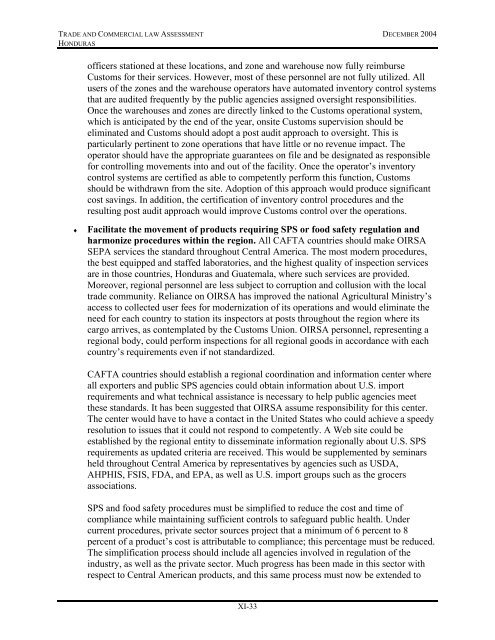Trade and Commercial Law Assessment - Honduras - Economic ...
Trade and Commercial Law Assessment - Honduras - Economic ...
Trade and Commercial Law Assessment - Honduras - Economic ...
You also want an ePaper? Increase the reach of your titles
YUMPU automatically turns print PDFs into web optimized ePapers that Google loves.
TRADE AND COMMERCIAL LAW ASSESSMENT DECEMBER 2004<br />
HONDURAS<br />
♦<br />
officers stationed at these locations, <strong>and</strong> zone <strong>and</strong> warehouse now fully reimburse<br />
Customs for their services. However, most of these personnel are not fully utilized. All<br />
users of the zones <strong>and</strong> the warehouse operators have automated inventory control systems<br />
that are audited frequently by the public agencies assigned oversight responsibilities.<br />
Once the warehouses <strong>and</strong> zones are directly linked to the Customs operational system,<br />
which is anticipated by the end of the year, onsite Customs supervision should be<br />
eliminated <strong>and</strong> Customs should adopt a post audit approach to oversight. This is<br />
particularly pertinent to zone operations that have little or no revenue impact. The<br />
operator should have the appropriate guarantees on file <strong>and</strong> be designated as responsible<br />
for controlling movements into <strong>and</strong> out of the facility. Once the operator’s inventory<br />
control systems are certified as able to competently perform this function, Customs<br />
should be withdrawn from the site. Adoption of this approach would produce significant<br />
cost savings. In addition, the certification of inventory control procedures <strong>and</strong> the<br />
resulting post audit approach would improve Customs control over the operations.<br />
Facilitate the movement of products requiring SPS or food safety regulation <strong>and</strong><br />
harmonize procedures within the region. All CAFTA countries should make OIRSA<br />
SEPA services the st<strong>and</strong>ard throughout Central America. The most modern procedures,<br />
the best equipped <strong>and</strong> staffed laboratories, <strong>and</strong> the highest quality of inspection services<br />
are in those countries, <strong>Honduras</strong> <strong>and</strong><br />
Guatemala, where such services are provided.<br />
Moreover, regional personnel are less subject to corruption <strong>and</strong> collusion with the local<br />
trade community. Reliance on OIRSA has improved the national Agricultural Ministry’ s<br />
access to collected user fees for modernization of its operations <strong>and</strong> would eliminate the<br />
need for each country to station its inspectors at posts throughout the region where its<br />
cargo arrives, as contemplated by the Customs Union. OIRSA personnel, representing a<br />
regional body, could perform inspections for all regional goods in accordance with each<br />
country’s requirements even if not st<strong>and</strong>ardized.<br />
CAFTA countries should establish a regional coordination <strong>and</strong> information center where<br />
all exporters <strong>and</strong> public SPS agencies could obtain information about U.S. import<br />
requirements <strong>and</strong> what technical assistance is necessary to help public agencies meet<br />
these st<strong>and</strong>ards. It has been suggested that OIRSA assume responsibility for this center.<br />
The center would have to have a contact in the United States who could achieve a speedy<br />
resolution to issues that it could not respond to competently. A Web site could be<br />
established by the regional entity to disseminate information regionally about U.S. SPS<br />
requirements as updated criteria are received. This would be supplemented by seminars<br />
held throughout Central America by representatives by agencies such as USDA,<br />
AHPHIS, FSIS, FDA, <strong>and</strong> EPA, as well as U.S. import groups such as the grocers<br />
associations.<br />
SPS <strong>and</strong> food safety procedures must be simplified to reduce the cost <strong>and</strong> time of<br />
compliance while maintaining sufficient controls to safeguard public health. Under<br />
current procedures, private sector sources project that a minimum of 6 percent to 8<br />
percent of a product’s cost is attributable to compliance; this percentage must be reduced.<br />
The simplification process should include all agencies involved in regulation of the<br />
industry, as well as the private sector. Much progress has been made in this sector with<br />
respect to Central American products, <strong>and</strong> this same process must now be extended to<br />
XI-33

















